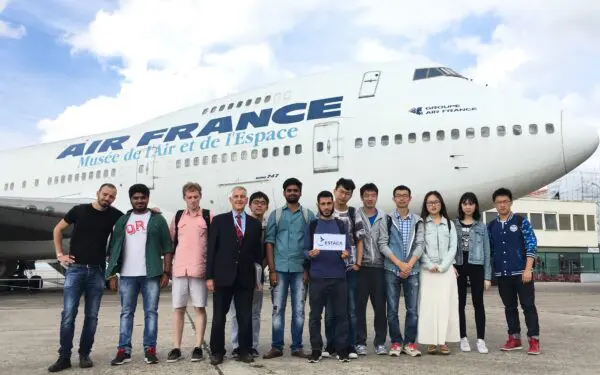
Pisa, Italy
Beyond 5G: Enabling Technologies, Opportunities and Research Challenges Ahead
When:
29 June - 03 July 2026
Credits:
6 EC
Read more
Engineering
When:
31 August - 07 September 2024
School:
University of Pisa Summer School
Institution:
University of Pisa
City:
Country:
Language:
English
Credits:
6 EC
Fee:
500 EUR


The enigma of consciousness is perhaps the most fascinating and enduring mystery in the universe. There are many hypotheses on the basis of which we try to answer to the life’s most difficult problem, all of which can be traced back to two broad categories: those that consider consciousness entirely reducible to the electro-chemical-physical processes that take place in the brain, and those that do not take that approach for granted.
Holding the first view means leaning toward scientific materialism, a monist and reductionist approach to reality, whereas being skeptical of this possibility and embracing a non-reductionist perspective can lead to very different outcomes, ranging from dualist approaches postulating the existence of a proto-psychic substance independent of a physical substratum to non-substantialist views that suggest an overall reconsideration of the subject-object relation to face the problem of consciousness. This latter hypothesis will be investigated from different perspectives, such as quantum physics, biology, neuroscience, artificial intelligence, and, most intensively, from the perspective of contemplative practices. The insights drawn from these fields of inquiry will be threaded together in a philosophical framework deeply inspired by phenomenology.
In fact, two domains that are as seemingly different as quantum physics and meditation and yoga, actually show, through the use of phenomenological understanding, some surprising convergences. The first constitutes the most advanced approach to the study of the physical world, which also extends to phenomena that take place at the nanoscopic level in biological tissues, while the latter allows for a profound, eternal, and accurate exploration of issues that are not accessible with objective methods and that concern first-person experience. However, when it comes to consciousness, they both appear to point in a similar direction. Moreover, answering the question of whether scientific materialism is capable of embracing the totality of reality, including consciousness, has a lot to do with what is meant by consciousness and what is meant by cognition.
In the ongoing cognitive debate, the exploration of consciousness is usually merged with and sometimes reduced to the study of the processes through which cognition takes place. But is the mere study of cognitive faculties enough to shed light on the mystery of consciousness, which is a precondition of every single cognition that takes place?
In order to start tackling these questions, the Summer School adopts a multidisciplinary approach that brings neurosciences, biology, artificial intelligence, and physics into a dialogue with the epistemological issue at stake in phenomenology and Eastern philosophies and contemplative practices. This mission requires contributions from eminently qualified teachers from a wide range of backgrounds.
The Summer School will take place in a residential setting, thanks to an agreement between the University of Pisa and the Lama Tzong Khapa Institute, which is located 35 km from Pisa and is renowned for the excellent quality of its Buddhist philosophy and psychology study programs.
Time will be dedicated to the experiential aspect to integrate the lessons with sessions focused on familiarization with contemplative practices (yoga and meditation). All sessions will be conducted by highly qualified teachers with different specialties and will be available to students who attend the Summer School online.
The 2024 edition of the Summer School Consciousness and Cognition is organized by the University of Pisa in collaboration with the Lama Tzong Khapa Institute, with the support of the Italian Buddhist Union.
Prof. Bruno Neri
University students of Philosophy, Psychology, Neuroscience, Bioengineering, Artificial Intelligence, Physics.
Scholars interested in the unsolved problem of Consciousness.
Psychologists, Psychotherapists and Psychiatrists.
- Philosophy: To acquire sensitivity to the existence of a dimension of consciousness that overcomes the distinction between subject and object and to understand its role in the current quest to explain consciousness, through a progression into insights drawn from Western philosophical approaches, especially phenomenology, and Eastern traditions and practices.
- Quantum mechanics: To understand the basic principles of quantum mechanics and comprehend the subtler issues connected with the interpretation of the theory and their possible relevance for a discussion of consciousness, the mind-body problem, and the nature of reality itself.
- Artificial intelligence: To learn the basic concepts and models of nature-inspired computational techniques and know how to apply them to a wide range of applications. Students will be exposed to the advantages and challenges of using computationally intelligent systems with human-like capabilities in terms of reasoning, learning, and adaptation.
- Biosemiotics: To learn the basics of biosemiotics and become acquainted with the semiotic nature of sign relationships in both biological and human-made systems, understand how cells act as semiotic units capable of interpreting their own environment through sign exchange, and ultimately comprehend how sign perception and epigenetic regulation are causally linked through differential gene expression.
- Contemplative practices: To comprehend the vision of Eastern traditions (Hinduism and Buddhism) concerning consciousness and its different levels and manifestations and to learn the foundations, characteristics, and aspects of the different types of meditation.
- Neurosciences and non-ordinary states of consciousness: After a description of the neural networks acting in the brain and a survey on the main techniques for investigating brain activity (electroencephalography, functional magnetic resonance imaging), to understand how non-ordinary states of consciousness induced by natural drugs, hypnosis, dreams, and deep meditation affect this activity.
- Practice: To become familiar with the experiential aspects of contemplative practices through meditation and yoga sessions led by highly qualified teachers. Like the rest of the program, these sessions will also be available to online students.
Fee
500 EUR, tuition fees
When:
31 August - 07 September 2024
School:
University of Pisa Summer School
Institution:
University of Pisa
Language:
English
Credits:
6 EC

Pisa, Italy
When:
29 June - 03 July 2026
Credits:
6 EC
Read more

Tallinn, Estonia
When:
27 July - 31 August 2026
Credits:
2 EC
Read more

Paris, France
When:
22 June - 17 July 2026
Credits:
10 EC
Read more